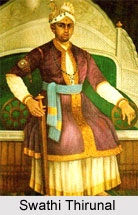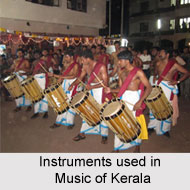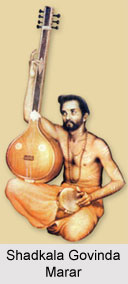 Music of Kerala has its origin in the primitive dances and plays, developed by the ancient people in conciliation with the deities of the hills and forests. Lyrical and spiritual ragas and talas of Carnatic music predominates the Keralite gharana. In addition, Kerala has its own native music system, sopanam, which is a sorrowful and bit-by-bit rendition of raga-based songs. It forms the background music in dance drama Kathakali.
Music of Kerala has its origin in the primitive dances and plays, developed by the ancient people in conciliation with the deities of the hills and forests. Lyrical and spiritual ragas and talas of Carnatic music predominates the Keralite gharana. In addition, Kerala has its own native music system, sopanam, which is a sorrowful and bit-by-bit rendition of raga-based songs. It forms the background music in dance drama Kathakali.
The other traditional music of Kerala also consists of melam performed with the help of instrument known as the chenda. Panchavadyam is a differing type of percussion ensemble consisting of 5 types of percussion instruments. The rulers of the land managed to be skilful in music, in spite of their martial preoccupations.
 History of Music of Kerala
History of Music of Kerala
The early recorded history of the music of Kerala is the Edakal, which comprises of 3 types of composition, which are listed as follows:
Classical songs known as Naadan Paattu.
Manipravalam of the Sanskrit tradition, which permitted a generous interspersing of Sanskrit with Malayalam.
The folk song rich in native elements.
To the late 20th century, the Malayalam poetry varies in degrees of the fusion of the 3 different strands. The oldest examples of Pattu are Ramacharitam and Vaishikatantram, both belonging to the 12th century.
Classical Music of Kerala
The state of Kerala has contributed to its own modulations to the tradition in the songs used in Kathakali and in the folk songs. The development of such art forms as Kuthu Kudiyattam, Astapadi Attan, Krishnanattam, Ramanattam, Kathakali gave a fill up to music in later days. An indigenous classical music called the Sopana sangeetham developed itself in the temples of Kerala, in the wake of the increasing popularity of Jayadeva`s Gita Govinda or Ashtapadi. The Kathakali padas composed by scholars like Irayimman Thampi and the Thullal songs of Kunjan Nambiar also enriched the musical culture of Kerala.
 Folk Music of Kerala
Folk Music of Kerala
The pulluvar of Kerala are linked to the snake worship. Snake God is considered as the presiding deity and performs certain sacrifices and sings songs which are called Pulluvan Pattu. Pulluvan Pattu is performed in the houses of the lower castes as well as those of the higher castes and obviously in the snake temples.
The famous dance drama Kathakali is also accompanied by songs that are in the Manipravalam language. Most of the songs are set in ragas that are based on the microtone-heavy Carnatic music.
Ottamthullal songs are meant to be sung during the performance of Ottamthullal. The artist needs to sing and dance to the music. The language used is not heavy and they are set to rhythms that simple, rare though a bit complicated.
 Carnatic Music
Carnatic Music
The credit for having given to Kerala an important place in the field of Carnatic music goes to Swathi Thirunal (1829-47), the ruler of Travancore. Some great names like Shadkala Govinda Marar, Vativelu, Ponnayya and the Tanjavur brothers need to be mentioned as they have contributed significantly to the growth of music at that time. In addition to classical music, Kerala also holds a place of pride for its contribution to the development of folk music and light music. The Vadakkan pattukal (Northern ballads), which celebrate the exploits of Tacholi Othenan, are very popular in Kerala.
Contributions of Swathi Thirunal to Music of Kerala
The reign of Swathi Thirunal, the ruler of Travancore, is called `the Augustan Age of Kerala Music`. A great patron of music, he attracted to his court some of the gifted musicians of the age. Shadkala Govinda MararIn collaboration with his Guru Meruswami who was well-versed in Hindustani and Carnatic music, Swathi Thirunal composed a number of songs in popular ragas in a variety of languages. Four musicians from Thanjavur namely Vativelu, Ponnayya, Chinnayya and Sivanandan, otherwise known as the `Tanjore Quartet`, lived in his court. To Vativelu goes the credit for the introduction of violin in Carnatic music. Apart from musicians who came to the court of Swathi Thirunal from outside the state, several gifted local musicians also enjoyed his patronage. Most celebrated among them was Shadkala Govinda Marar. He devised a Tamburu with seven strings instead of the usual four. He also achieved the unique distinction of being able to sing pallavis (thematic line of a song) into six degrees of time and this won for him the title Shadkala. Two other Kerala musicians who adorned the court of Swathi Thirunal were Parameswara Bhagavathar of Palakkad and Maliyekkal Krishna Marar.
Instruments used in Music of Kerala
Kerala has developed its own typical temple arts in which instrumental music plays an important part. Chenda Melam which is played with such instruments as Chenda, Kombu, Kuzhal etc., is a feature of all temple utsavams or festivals. Thayambaka which involves the elaborate display of talas on a classical piece of drum (Chenda) is also typical of Kerala. It is performed in several sessions, each session having its climaxes and anticlimaxes. Panchavadyam is another unique art in which the sounds from 5 musical instruments, (Maddalam, Idakka, Timila, Kombu and Elathalam) and 2 auxiliaries, Sankku (Conch) and Kuzhal, in varying pitches are synchronised. As in Thayambaka so too in Panchavadyam, each session lasts for hours. Nagaswaramelam, otherwise called Pandimelam, is another set of Vadyams played in connection with temple pujas and on such auspicious occasions as marriages.
Renowned Musicians of Kerala
The tradition of Kerala in the field of music has continued unsullied in modern times. To the galaxy of modern Kerala musicians belong such stalwarts as Vina Kalyanakrishna Bhagavatar, Kathakalashepam Anantarama Bhagavatar, Palghat Mani and Chembai Vaidyanatha Bhagavatar who have substantially enriched Carnatic music by their valuable contributions. Nowadays, folk dances, music and rites add on a special attraction among the people.




















